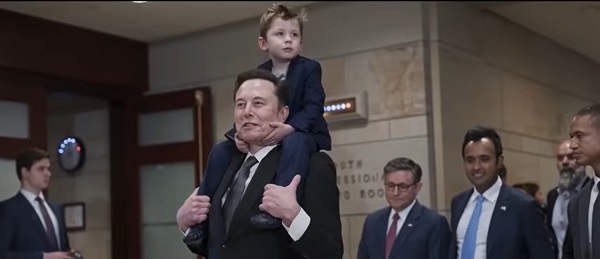Business
DOGE Must Focus On Big Picture To Achieve Big Change


From the Daily Caller News Foundation
By Jenny Beth Martin
President-elect Donald Trump’s new Department of Government Efficiency (DOGE) is wasting no time in laying the groundwork for its effort to cut the size and scope of government. That Elon Musk and Vivek Ramaswamy are the right men to lead this effort is beyond doubt — Musk famously slashed the workforce at Twitter after he bought it and Ramaswamy made shrinking the federal workforce the centerpiece of his campaign for president a year ago.
They know how to find cost savings, and they have shown they are not afraid to do so.
Visiting with congressional Republicans last week, Musk and Ramaswamy even declared they would be keeping a “naughty and nice” list of those who work with them to save taxpayer money and those who do not.
To that end — because who, especially at this time of year, doesn’t want to be on a “nice” list? — here are some thoughts.
First, they are going to have to look at the big picture. They won’t find the $2 trillion Musk pledged to save by focusing on the old standby, “waste, fraud, and abuse.” Yes, they are certainly going to find plenty of waste, fraud, and abuse in the Government Accountability Office (GAO) reports their staff will review, but that will not be enough.
To find the big savings, they are going to have to shrink not just the size of the federal government, but its scope. The federal government is not huge just because it spends money inefficiently, it is huge because it is doing things it has no business doing.
Second, they are going to have to take advantage of the fact that much of that huge government was never specifically authorized by the Congress. The federal behemoth was created by the mass of alphabet soup executive branch agencies that have for decades been imposing regulations that have the force of law, even though the Congress never approved them.
Reversing that is going to require taking a chain saw to federal regulations. And we will need a proportionally reduced federal workforce to match the reduced federal regulatory regime. That should not be a problem; huge numbers of federal employees still have not come back to work in their offices, even though the COVID-19 crisis ended years ago. The DOGE should recommend that any federal employee who refuses a directive to come back to work in the office should be terminated. That will save taxpayer money, too — a 10% cut in the federal workforce would yield about $40 billion in savings every year.
Third, recognize that to make permanent change, executive orders will not be enough — because executive orders can be reversed by the next president. Laws, on the other hand, can only be overturned with new action by the Congress and the president. That makes laws tougher to overturn.
One of the legislative changes that would serve the long-term interest in getting the federal government under control would be passage of the REINS Act, a proposed law that would require any federal agency that wanted to impose a new regulation that would have a significant impact on the economy to first gain approval from Congress in the form of an affirmative vote in both houses, and then the signature of the president. As I said when discussing this on my recent podcast with American Commitment’s Phil Kerpen, ‘Imagine that — Congress votes on something before it becomes law!”
A second legislative change that could help make a major difference would be reform of the civil service laws that govern the federal workforce. Musk and Ramaswamy are going to recommend significant elimination of positions in the federal workforce. Under the current system, it is significantly more difficult to remove employees than it is in the private sector — even employees who engage in insubordination or flagrantly breaking rules. And before you retort, “but the tradeoff they agree to, and that we must honor, is that civil service employees accept lower compensation in exchange for that greater job security,” a recent analysis by the Cato Institute shows that “the average federal civilian worker made $157,000 in wages and benefits in 2023, much higher than the average U.S. private sector wages and benefits of $94,000.”
Greater job security on top of higher compensation? That wasn’t the deal.
Rep. Barry Loudermilk (R-Ga.) introduced his MERIT Act in the last Congress. It was a proposed law that would have strengthened agency management’s power to remove poor employees, expedited timelines and made other reforms to bring the system closer to the private-sector model. Something along those lines could be extremely helpful as federal managers move to meet their reduced workforce needs.
The DOGE enterprise begins with broad public support — a recent poll conducted by McLaughlin & Associates for the organization I lead, Tea Party Patriots Action, shows that 71% of Americans support the creation of DOGE and 65% support firing government employees who do not return to their offices to work.
Musk and Ramaswamy have taken on a huge task, and they recognize the opportunity before them. By focusing on big-picture efforts to shrink the size and the scope of the federal government, they can help restore it to its constitutional moorings, with government officials in a smaller, less intrusive, less expensive government that is more responsive to the needs, desires, and authority of the citizens on whose behalf and in whose name they toil.
Jenny Beth Martin is honorary chairman of Tea Party Patriots Action.
Business
Storm clouds of uncertainty as BC courts deal another blow to industry and investment

From the Fraser Institute
By Tegan Hill and Jason Clemens
Recent court decision adds to growing uncertainty in B.C.
A recent decision by the B.C. Court of Appeal further clouds private property rights and undermines investment in the province. Specifically, the court determined British Columbia’s mineral claims system did not follow the province’s Declaration on the Rights of Indigenous Peoples Act (DRIPA), which incorporated the United Nations Declaration on the Rights of Indigenous Peoples (UNDRIP) into law.
DRIPA (2019) requires the B.C. provincial government to “take all measures necessary to ensure the laws of British Columbia are consistent with the Declaration,” meaning that all legislation in B.C. must conform to the principles outlined in the UNDRIP, which states that “Indigenous peoples have the right to the lands, territories and resources which they have traditionally owned, occupied or otherwise used or acquired.” The court’s ruling that the provincial government is not abiding by its own legislation (DRIPA) is the latest hit for the province in terms of ongoing uncertainty regarding property rights across the province, which will impose massive economic costs on all British Columbians until it’s resolved.
Consider the Cowichan First Nations legal case. The B.C. Supreme Court recently granted Aboriginal title to over 800 acres of land in Richmond valued at $2.5 billion, and where such aboriginal title is determined to exist, the court ruled that it is “prior and senior right” to other property interests. Put simply, the case puts private property at risk in BC.
The Eby government is appealing the case, yet it’s simultaneously negotiating bilateral agreements that similarly give First Nations priority rights over land swaths in B.C.
Consider Haida Gwaii, an archipelago on Canada’s west coast where around 5,000 people live—half of which are non-Haida. In April 2024, the Eby government granted Haida Aboriginal title over the land as part of a bilateral agreement. And while the agreement says private property must be honoured, private property rights are incompatible with communal Aboriginal title and it’s unclear how this conflict will be resolved.
Moreover, the Eby government attempted to pass legislation that effectively gives First Nations veto power over public land use in B.C. in 2024. While the legislation was rescinded after significant public backlash, the Eby’s government’s continued bilateral negotiations and proposed changes to other laws indicate it’s supportive of the general move towards Aboriginal title over significant parts of the province.
UNDRIP was adopted by the United Nations in 2007 and the B.C. Legislature adopted DRIPA in 2019. DRIPA requires that the government must secure “free, prior and informed consent” before approving projects on claimed land. Premier Eby is directly tied to DRIPA since he was the attorney general and actually drafted the interpretation memo.
The recent case centres around mineral exploration. Two First Nations groups—the Gitxaala Nation and the Ehattesaht First Nation—claimed the duty to consult was not adequately met and that granting mineral claims in their land “harms their cultural, spiritual, economic, and governance rights over their traditional territories,” which is inconsistent with DRIPA.
According to a 2024 survey of mining executives, more uncertainty is the last thing B.C. needs. Indeed, 76 per cent of respondents for B.C. said uncertainty around protected land and disputed land claims deters investment compared to only 29 per cent and 44 per cent (respectively) for Saskatchewan.
This series of developments have and will continue to fuel uncertainty in B.C. Who would move to or invest in B.C. when their private property, business, and investment is potentially at risk?
It’s no wonder British Columbians are leaving the province in droves. According to the B.C. Business Council, nearly 70,000 residents left B.C. for other parts of Canada last year. Similarly, business investment (inflation-adjusted) fell by nearly 5 per cent last year, exports and housing starts were down, and living standards in the province (as measured by per-person GDP) contracted in both 2023 and 2024.
B.C.’s recent developments will only worsen uncertainty in the province, deterring investment and leading to stagnant or even declining living standards for British Columbians. The Eby government should do its part to reaffirm private property rights, rather than continue fuelling uncertainty.
Business
Conservative MP warns Liberals’ national AI plan could increase gov’t surveillance

From LifeSiteNews
Conservative MP Leslyn Lewis raised concerns about the Liberals’ major investment in AI, which could lead to digital ids and loss of freedoms.
Conservative MP Leslyn Lewis is sounding the alarm over the Liberals’ nearly billion-dollar AI infrastructure investment, which could lead to digital IDs
In a December 2 post on X, Lewis raised concerns over the Liberals’ 2025 budget, which funds a $925.6 million “Sovereign Canadian Cloud” and national AI compute infrastructure at the same time as the Liberals are pushing digital identification on Canadians.
“Who audits the algorithms behind government’s new digital systems?” Lewis challenged. “What protections exist for Canadians in this new infrastructure? Who builds it? Who controls it? Who owns the data?”
“Good technology isn’t the issue, our freedoms, surveillance and good accountable governance in a digital era are the real issues,” she warned.
“Digital infrastructure is power, and it must never be implemented in secrecy or without parliamentary scrutiny,” Lewis declared.
Despite spending nearly one billion taxpayer dollars on the project, Prime Minister Mark Carney provides surprisingly few details on how the infrastructure will work and what its purpose will be.
“Budget 2025 proposes to provide $925.6 million over five years, starting in 2025-26, to support a large-scale sovereign public AI infrastructure that will boost AI compute availability and support access to sovereign AI compute capacity for public and private research,” the budget read.
“The investment will ensure Canada has the capacity needed to be globally competitive in a secure and sovereign environment,” it continued.
Alarmingly, the funding comes at the same time as Liberals are moving forward with digital identification systems, despite warnings that they will infringe on Canadians freedoms.
In November, as reported by LifeSiteNews, Liberals moved ahead with digital identification for anyone seeking federal benefits, including seniors on Old Age Security.
Additionally, the Canadian government hired outside consultants tasked with looking into whether or not officials should proceed with creating a digital ID system for all citizens and residents.
Per a May 20 Digital Credentials Issue memo, and as noted by Blacklock’s Reporter, the “adoption” of such a digital ID system may be difficult.
Canada’s Privy Council research from 2023 noted that there is strong public resistance to the use of digital IDs to access government services.
Nonetheless, Conservative leader Pierre Poilievre sounded the alarm by promising to introduce a bill that would “expressly prohibit” digital IDs in Canada.
Critics have warned that the purpose of such IDs is actually to centralize control over citizens. This opinion seems to be mirrored by the general public, with a Bank of Canada survey finding that Canadians are wary of a government-backed digital currency, concluding that a “significant number” of citizens would resist the implementation of such a system.
Digital IDs and similar systems have long been pushed by globalist groups like the World Economic Forum, an organization with which Carney has extensive ties, under the guise of ease of access and security.
-

 espionage2 days ago
espionage2 days agoWestern Campuses Help Build China’s Digital Dragnet With U.S. Tax Funds, Study Warns
-

 Bruce Dowbiggin2 days ago
Bruce Dowbiggin2 days agoWayne Gretzky’s Terrible, Awful Week.. And Soccer/ Football.
-

 Agriculture2 days ago
Agriculture2 days agoCanada’s air quality among the best in the world
-

 Health2 days ago
Health2 days agoCDC Vaccine Panel Votes to End Universal Hep B Vaccine for Newborns
-

 Business2 days ago
Business2 days agoCanada invests $34 million in Chinese drones now considered to be ‘high security risks’
-

 Great Reset2 days ago
Great Reset2 days agoSurgery Denied. Death Approved.
-

 Business2 days ago
Business2 days agoThe EU Insists Its X Fine Isn’t About Censorship. Here’s Why It Is.
-

 Health1 day ago
Health1 day agoThe Data That Doesn’t Exist








